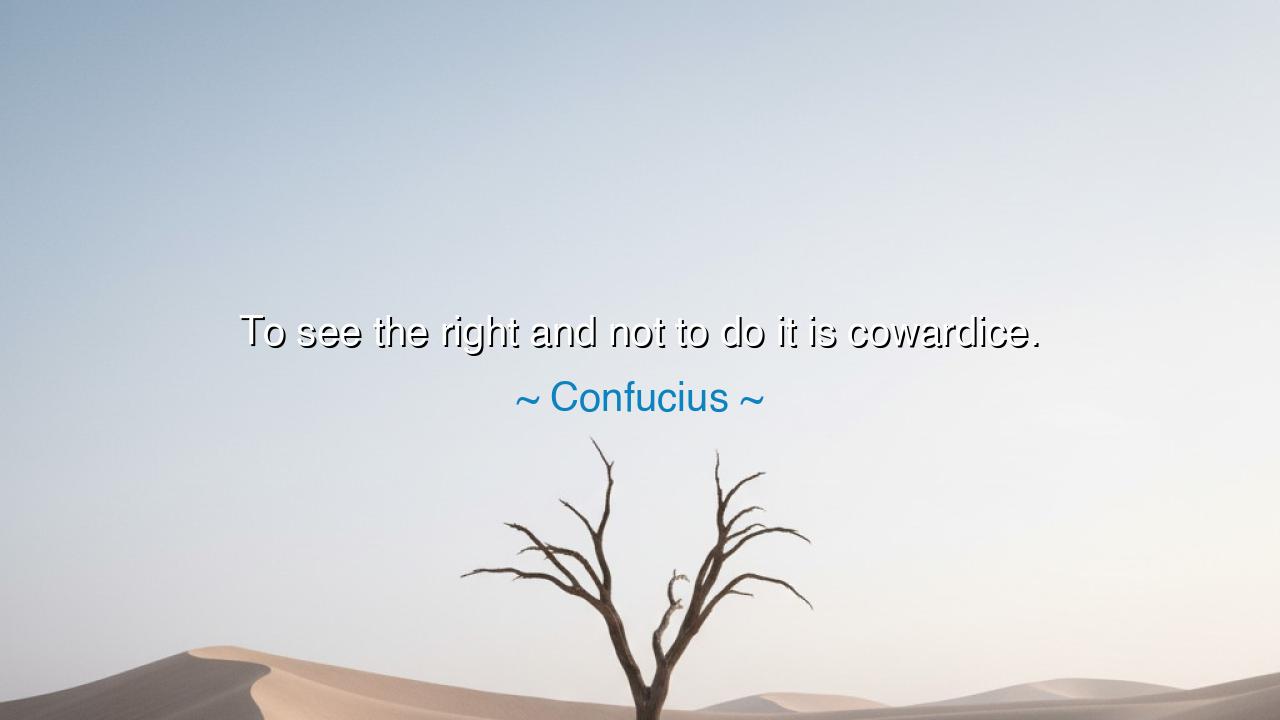
To see the right and not to do it is cowardice.






In the immortal words of the sage Confucius, teacher of order, virtue, and harmony, we are given a truth that strikes at the very essence of moral action: “To see the right and not to do it is cowardice.” These words, spoken more than two millennia ago, still resound with undiminished power — for they speak to the eternal struggle between knowing and doing, between conscience and fear. Confucius, who lived in an age of warlords and chaos, saw that knowledge of what is right is meaningless unless it gives birth to courage. To perceive justice and yet remain silent; to know compassion and yet turn away — this, he declared, is the most subtle and dangerous form of cowardice.
In this teaching, Confucius reveals that cowardice is not merely the fear of battle or the trembling before danger; it is the failure of the moral will. The coward, in his view, is not only the one who flees from swords, but the one who flees from truth. To see suffering and ignore it, to witness injustice and remain unmoved, to recognize deceit yet allow it to spread — these are the quiet betrayals that corrode the soul. True virtue, he taught, is not passive. It demands action, for what use is wisdom if it is not lived? Thus, in this single sentence, Confucius joins morality and bravery as one — to know the good is to be called to perform it, and to deny that call is to deny one’s own humanity.
The origin of this wisdom lies deep within the Analects, the collected sayings of Confucius recorded by his disciples. It was a time when rulers sought power more than righteousness, when the noble principles of the past were forgotten. Confucius, walking from state to state with only his words as his weapon, sought to awaken the spirit of righteousness in the hearts of men. He saw that knowledge without virtue leads to corruption, and virtue without courage leads to decay. To him, the scholar and the ruler alike must have the strength to act upon what is just, no matter the cost. For he understood: it is not enough to know the path — one must walk it.
Throughout history, we find countless souls who embodied this truth. Consider Dietrich Bonhoeffer, the German theologian who, during the shadow of the Second World War, saw the evil of tyranny rising in his homeland. Many knew it was wrong — yet few dared to speak. Bonhoeffer could not remain silent; his conscience demanded action. He joined the resistance, and though his courage cost him his life, his moral clarity endures across generations. In him, we see Confucius’ teaching made flesh — that to recognize right and refuse to act is to surrender one’s integrity, but to stand firm for justice, even in peril, is the highest form of honor.
In a more humble way, this truth is written into the lives of all people. Every day, each of us stands at the crossroads of right and fear. We see moments when we could speak truth, defend the weak, or correct a wrong — yet often we hesitate, convincing ourselves it is not our place. Confucius calls this hesitation by its true name: cowardice. For the greatest evils do not flourish through the acts of the wicked alone, but through the silence of the good. The soul that sees the right and turns away begins to die inwardly, while the one that dares to act grows in strength and peace.
The power of this quote lies in its simplicity. It strips away excuses and forces us to confront our own inaction. We cannot plead ignorance once we have seen injustice. We cannot claim innocence when we have withheld compassion. Knowledge brings responsibility, and with it, the call to courage. The right path may be difficult, but in walking it, we preserve the dignity of our spirit. And though courage may not always bring safety, it always brings truth — and truth is the foundation of a life well lived.
So, my listener, take this teaching as a torch in the darkness of the world: when you see the right, do it. Speak for the voiceless, even when your own voice trembles. Stand for justice, even if you stand alone. Help those who suffer, even when no one is watching. For the measure of your soul will not be found in what you knew, but in what you dared to do. Confucius calls upon us to live with moral bravery, for in such courage lies the strength of all that is noble. Let not your fear rule your heart — let righteous action be your banner, and in doing so, you shall walk in the path of the wise and the eternal.






AAdministratorAdministrator
Welcome, honored guests. Please leave a comment, we will respond soon